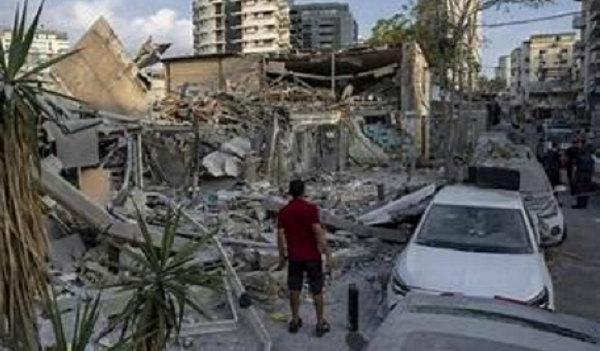Israel-Hamas ceasefire: Gaza marks Ramadan in despair as Blinken holds truce talks in Cairo
U.S. Secretary of State Antony Blinken met Egypt’s president on Thursday for talks on securing a Gaza ceasefire, as Gaza’s Palestinians despaired at observing Ramadan without relatives who have been killed and lacking adequate food for their children.
In Gaza, Israel’s offensive focused on Al Shifa hospital, the only partially working medical facility in the north of the Strip, for a fourth day, and local residents said they had seen buildings inside the complex in flames.
With hunger spreading in the densely populated enclave, where five months of war have created critical food shortages, the head of the World Health Organization (WHO) said only the expansion of land crossings into Gaza could prevent famine.
Blinken met Abdel Fattah El-Sisi in Cairo after ceasefire talks resumed in Qatar this week, centred on a truce of around six weeks that would allow the release of 40 Israeli hostages in return for hundreds of Palestinians detained in Israeli jails.
Blinken told the Arabic broadcaster Al Hadath that such a ceasefire would bring “immediate relief to so many people who are suffering in Gaza – the children, the women, the men”, and that the U.S. had drafted a U.N. resolution to that effect.
The main sticking point remains that Hamas says it will release hostages only as part of an agreement that would end the war, while Israel says it will discuss only a temporary pause.
“I think the gaps are narrowing, and I think an agreement is very much possible,” Blinken told Al Hadath.
Later on Thursday, a statement issued by Israeli Prime Minister Benjamin Netanyahu’s office said spy chief David Barnea would travel to Qatar on Friday to meet mediators.
Barnea will meet his U.S. counterpart CIA Director Bill Burns, Qatar’s Prime Minister Sheikh Mohammed bin Abdulrahman Al Thani and Egypt’s intelligence chief Abbas Kamel, it said.
Israel’s offensive has now killed almost 32,000 Palestinians, according to Gaza health authorities.
The war was triggered by militants from Hamas, which governs Gaza, storming into southern Israel on Oct. 7, killing around 1,200 people and taking 253 hostages, by Israeli tallies.
European Union leaders meeting in Brussels were also due to call for a ceasefire. EU foreign policy chief Josep Borrell urged a stronger message to Israel to protect civilians and said it had “the right to defend, (but) not to revenge”.
Sisi stressed the need for a truce to address the escalating humanitarian crisis and warned of the dangers of a military operation in Rafah, echoing growing international concern.
The southern Gaza city is the last zone of relative safety for civilians and more than half the enclave’s population is now sheltering there, pressed against the Egyptian border.
An Israeli official insisted Israel would take control of Rafah even if it caused a rift with the United States, saying that a quarter of Hamas’s original fighting force was there.
“It’s going to happen. And it will happen even if Israel is forced to fight alone,” Strategic Affairs Minister Ron Dermer said in a podcast.
Officials from 36 countries and U.N. agencies gathered in Cyprus to discuss ways to expedite humanitarian deliveries.
One aid ship arrived in the enclave last week from Cyprus and two others are expected to depart soon.
But aid agencies say the shipments are logistically difficult and cannot replace deliveries by truck.
“Recent efforts to deliver food by air and sea are welcome, but only the expansion of land crossings will enable large-scale deliveries to prevent famine,” WHO Director-General Tedros Adhanom Ghebreyesus said.
“Once again, we ask Israel to open more crossings and accelerate the entry and delivery of water, food, medical supplies and other humanitarian aid into and within Gaza.”
At a Gaza school run by the U.N. Palestinian refugee agency, thousands of people who have fled Israeli air strikes barely had enough food to break the daily Ramadan fast, unlike fellow Muslims around the world marking the holy month with post-fast treats.
“Go and check all the markets … You wouldn’t find a single can of fava beans or chickpeas for the kids to eat,” said Basel al-Soueidi, sheltering in the Jabalia refugee camp.
He was cooking a few red lentils for the surviving members of his family, 17 of whom have been killed in the war.
“I miss them all – there is no food or water, there is nothing. All my cousins died, there’s no one left. We used to all gather during Ramadan, with my uncle,” he said, close to tears.
Near Al Shifa, residents told Reuters via a chat app that the army had blown up houses close by as buildings in the hospital complex burned.
Rabah, a father of five, said people in the area were trapped inside their houses amid clashes in the streets.
“Israel sent tanks back into the heart of Gaza City to destroy what is left of its homes and roads,” he said.
Israel said its troops had killed more than 50 Hamas gunmen over the previous day, taking the number of fighters killed around the hospital to 140, along with two Israeli soldiers.
It said it had located military infrastructure and weapons in and around the facility, showing images of AK-47 automatic rifles, rocket-propelled grenades, mortars and other artillery.
Military spokesperson Rear Admiral Daniel Hagari said many Hamas and Islamic Jihad fighters had been hiding in
Al Shifa.
Night-vision videos distributed by the Israeli military showed soldiers unloading food and water into the hospital.
Hamas has denied that the hospital harbours fighters and said those killed were wounded patients and displaced people.
This article was first reported by Reuters













